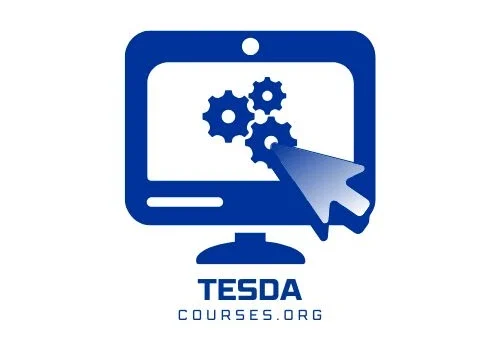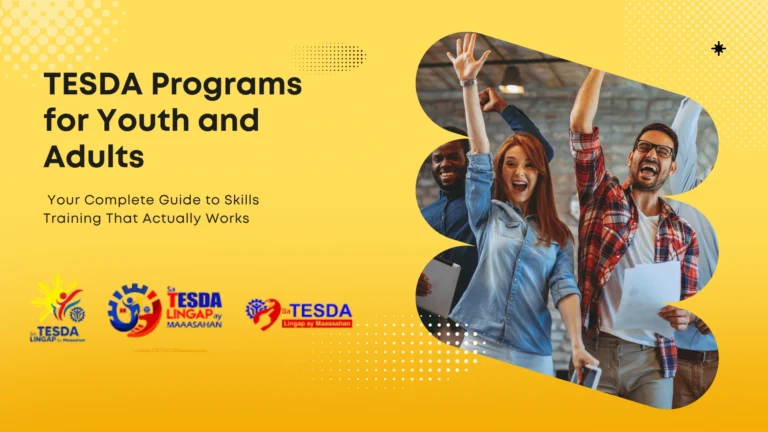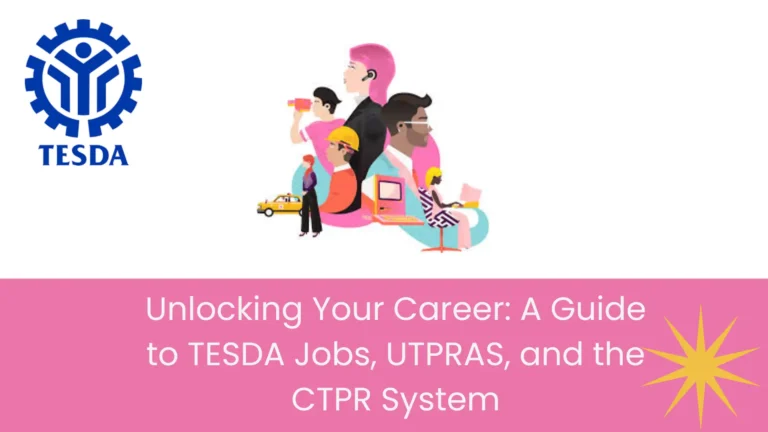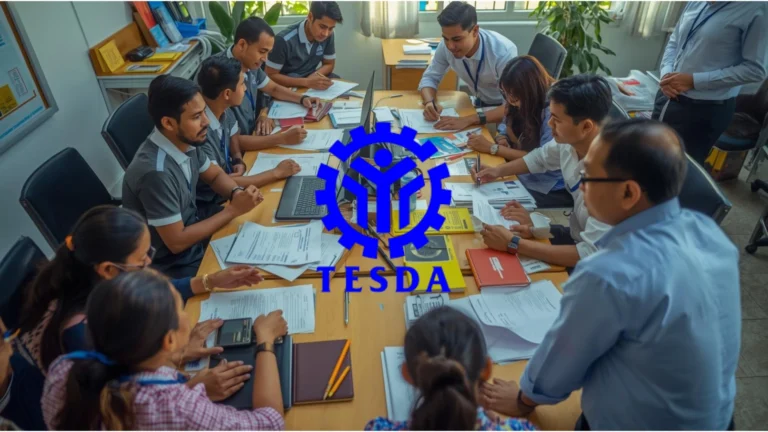TESDA Technical Education: Your Complete Guide to Building a High-Paying Career Without a College Degree
Let me tell you about my cousin Miguel. Smart kid. Got accepted to a prestigious engineering program. Two years in, he dropped out—drowning in tuition debt, hating every minute of theoretical coursework that felt disconnected from reality.
His parents were devastated. I mean, the whole extended family had expectations.
Fast forward three years: Miguel’s now earning more than most of his college-graduate friends. He’s a certified automotive technician with his own repair shop, clients lined up for weeks, and zero student debt. His secret? TESDA technical education.
Here’s the uncomfortable truth nobody wants to say out loud: college isn’t the only path to success. Sometimes, it’s not even the best path. And in today’s skills-based economy, TESDA technical education programs might actually give you a better ROI (return on investment) than a four-year degree.
If you’re an international student exploring education options in the Philippines, or if you’re questioning whether traditional university is right for you, this guide is going to blow your mind. I’m going to show you why TESDA technical training isn’t a “backup plan”—it’s often the smarter choice.
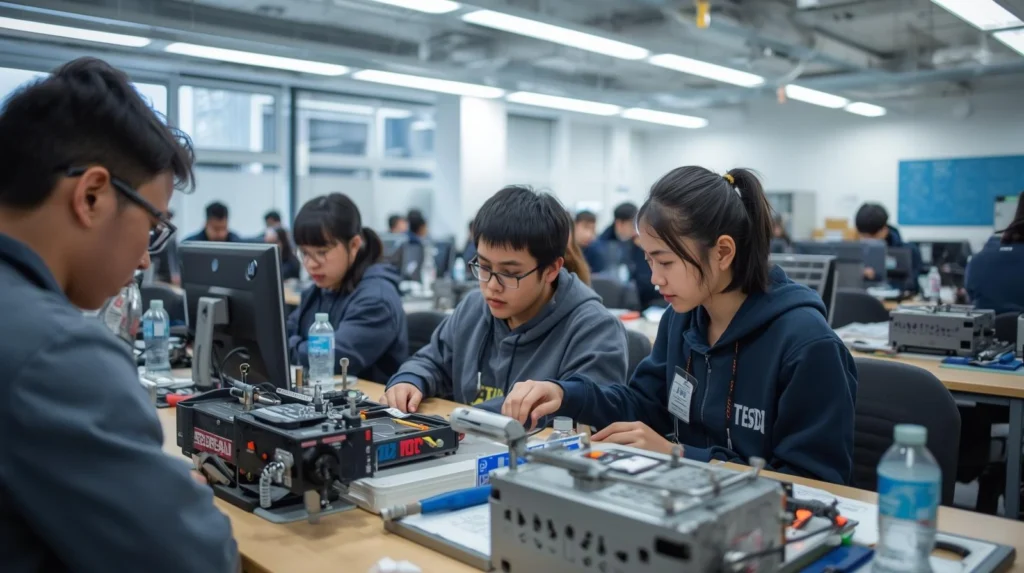
The Complete Guide to TESDA Scholarships: How to Get Your Allowance and Train for Free
What Is TESDA Technical Education?
Let’s start with clarity because confusion helps nobody.
TESDA technical education is a specialized form of post-secondary education focused on teaching specific, job-ready technical skills rather than broad academic knowledge. Think “how to actually do things” versus “theories about things.”
Technical Education vs. Vocational Education
People use these terms interchangeably, but there’s a subtle difference worth understanding:
Technical Education:
- Higher-level technical knowledge
- Often involves complex machinery or systems
- Requires understanding of scientific principles
- Problem-solving and troubleshooting emphasis
- Examples: Electronics technician, Computer systems servicing, Industrial machinery operation
Vocational Education:
- Practical skill training for specific trades
- Hands-on, task-focused learning
- Less theoretical foundation required
- Service and production orientation
- Examples: Housekeeping, Cookery, Beauty care
The Overlap: TESDA offers both, and honestly, the distinction matters less than the outcome: you learn marketable skills that lead to employment.
Why Technical Education Matters Now
The Skills Gap Crisis: According to industry reports, there’s a massive disconnect:
- Employers can’t find qualified technical workers
- Graduates can’t find jobs matching their degrees
- Technical positions pay surprisingly well
- Four-year degrees increasingly don’t guarantee employment
The Economic Reality:
- Technical workers often earn more than junior professionals
- Career progression can be faster
- Less educational debt means wealth builds earlier
- Entrepreneurship is easier with technical skills
The Future of Work:
- Automation replaces routine white-collar jobs too
- Technical troubleshooting skills remain valuable
- Hands-on trades harder to outsource
- Industry 4.0 creates new technical opportunities
The Ultimate Guide to TESDA Requirements: Enrollment, Certification, and Center Accreditation
TESDA Technical Education Programs: What’s Available
The range of TESDA technical education programs is honestly impressive. Let’s break down the major categories:
Industrial and Manufacturing Technology
Electrical and Electronics:
- Electrical Installation and Maintenance NC I-IV
- Electronics Products Assembly and Servicing
- Industrial Electronics Maintenance
- Mechatronics
- Power Distribution Systems
- Programmable Logic Controller (PLC) Programming
- Instrumentation and Control
Mechanical Technology:
- Machine Shop Operations
- Industrial Machinery Maintenance
- CNC (Computer Numerical Control) Machining
- Tool and Die Making
- Millwright Operations
- Precision Measuring Instruments
Welding and Metal Fabrication:
- Shielded Metal Arc Welding (SMAW) NC I-II
- Gas Metal Arc Welding (GMAW) NC I-II
- Gas Tungsten Arc Welding (GTAW) NC I-II
- Flux Cored Arc Welding (FCAW)
- Pipefitting and Plumbing
- Sheet Metal Working
- Structural Metal Fabrication
Automotive Technology:
- Automotive Servicing NC I-III
- Automotive Body Painting
- Automotive Engine Overhaul
- Motorcycle/Small Engine Servicing
- Heavy Equipment Operation NC II
- Automotive Electrical Systems
Information and Communications Technology (ICT)
Computer Technology:
- Computer Systems Servicing NC II
- Computer Hardware Servicing
- Network Configuration and Administration
- Server Administration
- Computer Programming (.NET, Java, PHP)
- Database Management
Digital Media:
- Animation NC II-III
- 3D Animation
- Graphic Design
- Web Development NC III
- Digital Illustration
- Game Development
- Video and Audio Production
Telecommunications:
- Telecommunications Installation and Maintenance
- Fiber Optics Installation
- Wireless Communications
- Satellite Systems Installation
The Ultimate Guide to TESDA Training Centers, Courses, and Contact Information Nationwide
Construction Technology
Building Construction:
- Carpentry NC I-IV
- Masonry NC I-III
- Tile Setting NC I-II
- Scaffolding
- Construction Painting
- Plumbing NC I-IV
- Construction Wiring
Heavy Equipment:
- Heavy Equipment Operation NC II
- Hydraulic Systems Maintenance
- Equipment Servicing and Repair
- Crane Operation
- Excavator Operation
Specialized Construction:
- Refrigeration and Air-Conditioning (RAC) Servicing NC I-III
- Elevator and Escalator Maintenance
- Fire Protection System Installation
- Building Automation Systems
Maritime and Offshore Technology
Marine Engineering:
- Marine Engine Maintenance
- Ship Electrical Systems
- Marine Welding and Fabrication
- Maritime Electronics
- Ship Refrigeration Systems
Maritime Operations:
- Ship Navigation Systems
- Cargo Handling Equipment
- Marine Safety Systems
- Offshore Platform Technology
Renewable Energy Technology
Emerging Green Tech:
- Solar Panel Installation and Maintenance NC II
- Wind Turbine Technology
- Biogas Systems Installation
- Energy Efficiency Auditing
- Green Building Technology
- Electric Vehicle Technology
TESDA Technical Courses: Top Programs for 2025
Let’s look at the most in-demand TESDA technical courses based on employment rates and salary potential:
Top 15 High-Value Technical Programs
| Rank | Technical Course | Duration | Starting Salary | 5-Year Salary | Employment Rate |
|---|---|---|---|---|---|
| 1 | Electrical Installation & Maintenance NC II | 4-6 months | ₱18,000-₱25,000 | ₱35,000-₱55,000 | 94% |
| 2 | RAC Servicing NC III | 6-9 months | ₱20,000-₱28,000 | ₱40,000-₱70,000 | 92% |
| 3 | Automotive Servicing NC II-III | 4-8 months | ₱16,000-₱24,000 | ₱30,000-₱60,000 | 91% |
| 4 | Computer Systems Servicing NC II | 3-4 months | ₱15,000-₱22,000 | ₱28,000-₱50,000 | 89% |
| 5 | SMAW NC I-II (Welding) | 3-5 months | ₱500-₱900/day | ₱1,200-₱2,000/day | 93% |
| 6 | Heavy Equipment Operation NC II | 2-3 months | ₱700-₱1,200/day | ₱1,500-₱2,500/day | 95% |
| 7 | Plumbing NC II-IV | 4-8 months | ₱500-₱800/day | ₱1,000-₱1,800/day | 90% |
| 8 | Mechatronics Servicing NC III | 6-12 months | ₱22,000-₱30,000 | ₱45,000-₱80,000 | 88% |
| 9 | Electronics Products Assembly NC II | 3-6 months | ₱16,000-₱22,000 | ₱28,000-₱48,000 | 87% |
| 10 | CNC Programming and Machining | 4-6 months | ₱20,000-₱28,000 | ₱38,000-₱65,000 | 89% |
| 11 | Industrial Machinery Maintenance | 4-6 months | ₱18,000-₱26,000 | ₱35,000-₱60,000 | 90% |
| 12 | PLC Programming NC III | 3-5 months | ₱22,000-₱32,000 | ₱40,000-₱75,000 | 86% |
| 13 | Carpentry NC II-IV | 4-8 months | ₱500-₱800/day | ₱1,000-₱1,600/day | 88% |
| 14 | Animation NC II-III | 4-8 months | ₱18,000-₱25,000 | ₱35,000-₱80,000 | 84% |
| 15 | Web Development NC III | 4-6 months | ₱20,000-₱28,000 | ₱40,000-₱90,000 | 87% |
TESDA Courses for Abroad: The Ultimate Guide to In-Demand NC II & NC III Certifications
Why These Programs Are Hot
Industry Demand:
- Infrastructure boom in Philippines and abroad
- Technology sector growth
- Manufacturing expansion
- Skilled worker shortage
- Aging workforce needs replacement
Salary Progression:
- Technical skills command premium pay
- Experience dramatically increases earnings
- Specialization adds value
- Certification stacking boosts income
- Self-employment highly profitable
International Opportunities:
- Middle East pays premium for technical skills
- Singapore actively recruits technical workers
- Canada skilled trades immigration pathways
- Australia high demand for tradespeople
- Japan technical intern programs
TESDA Technical Education Scholarship: Free Training Opportunities
Here’s the beautiful part: TESDA technical education scholarship programs can make your training completely free. Let me break down your options:
Technical Education Scholarships
Training for Work Scholarship Program (TWSP):
Coverage for Technical Programs:
- Full tuition and training fees
- Assessment and certification fees
- Technical manuals and learning materials
- Professional toolkit (₱5,000-₱8,000 value)
- Training allowance (₱4,000-₱8,000)
- Accident insurance
- Equipment access
Priority Technical Programs:
- High-demand industrial courses
- Emerging technology programs
- Infrastructure-related skills
- Manufacturing and production
- Technology and ICT courses
Enhanced Benefits for Technical Education:
- Higher tool allowance for technical programs
- Advanced equipment training
- Industry exposure visits
- Possible on-the-job training with pay
- Direct job placement assistance
Special Technical Education Grants
PESFA (Private Education Student Financial Assistance):
For Technical Institutes:
- Up to ₱25,000 per year for technical programs
- Renewable for multi-year courses
- Covers tuition and specialized training fees
- Technical equipment usage fees included
Enterprise-Based Training Scholarships:
Company-Sponsored Technical Training:
- Full scholarship from hiring company
- Training allowance during program
- Guaranteed employment upon completion
- Modern equipment and facilities
- Industry-standard practices
- Mentorship from professionals
Common Industries Offering:
- Automotive companies
- Electronics manufacturers
- Construction firms
- Shipbuilding companies
- Semiconductor industry
- Heavy equipment companies
Dual Training System:
Company-School Partnership:
- 30% institutional training
- 70% in-company training
- Paid apprenticeship (₱8,000-₱15,000/month)
- Real workplace exposure
- High hiring rate (80-90%)
- Latest technology and methods
Sector-Specific Scholarships
For Women in Technical Education:
- Special grants for non-traditional skills
- Women in welding programs
- Female automotive technicians
- Women electricians
- Girls in technology
For Indigenous Peoples:
- Cultural sensitivity in technical training
- Community-based programs
- Indigenous technology integration
- Livelihood-focused training
For Persons with Disabilities:
- Adaptive technical training
- Modified equipment
- Specialized instruction
- Assistive technology
- Inclusive workplaces connections
TESDA Technical Education Requirements: What You Need
Understanding TESDA technical education requirements is crucial because technical programs often have specific prerequisites:
General Requirements
Basic Documents:
- Accomplished application form
- Birth certificate (PSA-issued)
- Valid government ID (2 photocopies)
- Recent 2×2 photos (4-6 copies)
- High school diploma or transcript
Age Requirements:
- Minimum 18 years old (most programs)
- Some programs accept 16-17 with parental consent
- No maximum age limit
- Senior citizens welcome in appropriate programs
Educational Prerequisites:
By Program Level:
| NC Level | Minimum Education | Why It Matters |
|---|---|---|
| NC I | Elementary graduate | Basic literacy and numeracy |
| NC II | High school level or equivalent | Reading technical manuals, safety procedures |
| NC III | High school graduate | Math, science basics for troubleshooting |
| NC IV | High school graduate + experience | Advanced concepts, supervisory knowledge |
Technical Program-Specific Requirements
For Electrical Programs:
- Color vision test (crucial for wiring identification)
- Basic mathematics competency
- Physical ability to work with tools
- No fear of heights (for some specializations)
- Safety awareness assessment
For Automotive Programs:
- Manual dexterity assessment
- Mechanical aptitude test
- Physical strength for heavy parts
- Basic mathematics skills
- Problem-solving ability
For Welding Programs:
- Good eyesight (correctable)
- Steady hands test
- Physical stamina
- Heat tolerance assessment
- No respiratory conditions
- Safety equipment comfort
For ICT Programs:
- Basic computer literacy
- Typing proficiency test (sometimes)
- Logical reasoning ability
- English comprehension
- Mathematical aptitude
For Heavy Equipment Programs:
- Valid driver’s license (helpful but not always required)
- Physical fitness certificate
- Good vision and hearing
- Coordination and spatial awareness tests
- Medical clearance
- Drug test
Health and Safety Requirements
Medical Requirements:
- General health certificate
- Drug test results
- TB screening (for some programs)
- Physical fitness for program demands
- Mental health fitness
Safety Equipment: Many technical programs require personal safety equipment:
Common PPE Costs:
- Safety shoes: ₱800-₱2,000
- Protective eyewear: ₱200-₱800
- Work gloves: ₱150-₱500
- Hard hat: ₱300-₱800
- Work coveralls/uniform: ₱500-₱1,500
- Ear protection: ₱100-₱400
Good News: Many scholarship programs provide these, or training centers include them in fees.
For International Students
Additional Requirements:
- Valid passport
- Student visa or appropriate visa type
- ACR (Alien Certificate of Registration)
- Proof of legal stay
- English or Filipino language proficiency
- Educational credentials authentication
- Financial capacity documentation
- Health insurance
TESDA Technical Education Admission: Enrollment Process
The TESDA technical education admission process is straightforward but has some technical program peculiarities:
Step 1: Aptitude and Assessment
Unlike general vocational courses, many technical programs require:
Aptitude Testing:
- Mechanical reasoning tests
- Spatial visualization
- Problem-solving scenarios
- Manual dexterity assessment
- Technical comprehension
Why This Matters: Technical education requires certain cognitive abilities. These tests aren’t about excluding people—they’re about ensuring you’ll succeed and enjoy the work.
Preparation Tips:
- Take online aptitude practice tests
- Review basic math and physics
- Practice spatial reasoning puzzles
- Familiarize yourself with tools and equipment
- Don’t stress—natural ability matters more than study
Step 2: Program Selection and Research
Choosing Your Technical Path:
Questions to Ask Yourself:
- What interests me genuinely? (You’ll be doing this for years)
- Am I physically capable of the demands?
- What’s the salary trajectory?
- What are employment prospects locally and internationally?
- Can I see myself running a business in this field?
- Does this align with long-term career goals?
Research Methods:
- Visit actual workplaces in the field
- Shadow a professional for a day
- Talk to graduates of the program
- Check job postings for requirements
- Assess your natural aptitudes
- Consider work-life balance
Step 3: Training Center Selection
Technical Program Factors:
Equipment Quality:
- Modern, industry-standard equipment
- Sufficient quantity (student-equipment ratio)
- Regular maintenance and updates
- Safety features functional
- Calibration current
Instructor Qualifications:
- Industry experience (minimum 5 years ideal)
- National certificates in specialization
- Trainer’s methodology certification
- Continuous professional development
- Active industry connections
Facilities:
- Adequate workshop space
- Proper ventilation and lighting
- Safety equipment availability
- Tool storage and organization
- Emergency systems functional
Industry Linkages:
- Company partnerships for OJT
- Equipment donations from industry
- Guest lecturers from companies
- Job placement arrangements
- Internship opportunities
Step 4: Application and Enrollment
Timeline for Technical Programs:
- Research phase: 2-4 weeks
- Application preparation: 1-2 weeks
- Submission and processing: 1-2 weeks
- Aptitude testing (if required): 1 day
- Results and acceptance: 1 week
- Enrollment and orientation: 1 week
Total: Plan 6-10 weeks from research to training start.
TESDA Technical Training Centers: Where to Study
TESDA technical training centers vary in quality and specialization. Here’s how to choose:
Government Technical Institutes
TESDA Technology Institutions (TTIs):
Philippines has specialized technical institutes:
Major TTIs:
- TESDA Women’s Center (Metro Manila) – Specialized technical programs for women
- Southern Philippines Agri-Business and Marine and Aquatic School of Technology (SPAMAST)
- Western Visayas College of Science and Technology
- Mindanao State University – Iligan Institute of Technology
Advantages:
- Cutting-edge equipment (government funding)
- Highly qualified instructors
- Free or heavily subsidized
- Strong industry connections
- Research and development involvement
Challenges:
- Very competitive admission
- Limited slots
- Fixed schedules
- Geographic limitations
Private Technical Institutes
Top-Tier Private Technical Schools:
Reputable Institutions:
- STI (Systems Technology Institute) – ICT specialization
- AMA Computer Learning Center – Technology focus
- SEED (Specialist in Electronics and Computer-Based Education and Development)
- PATTS College of Aeronautics – Automotive and aviation
- Technological University of the Philippines (TUP) – Engineering technology
What to Look For:
- TESDA registration current
- Industry accreditations (ISO, industry associations)
- Graduate employment rates
- Modern equipment inventory
- Qualified technical instructors
- Strong company partnerships
Industry Training Centers
Company-Operated Facilities:
Manufacturing Companies:
- Toyota Training Center
- Mitsubishi Motors Training Center
- Samsung Electronics Training
- Philips Training Center
- Various semiconductor company centers
Advantages:
- Latest equipment and technology
- Industry-standard practices
- Real-world applications
- High employment rates
- Possible hiring after training
Access:
- Usually through enterprise-based training programs
- Scholarship competitions
- Company employee children priority
- Community outreach programs
Regional Technical Centers
Provincial Training Centers:
Each region has TESDA-operated centers specializing in local industry needs:
Examples:
- Batangas: Automotive and electronics (industrial zone)
- Cavite: Manufacturing and assembly
- Cebu: Shipbuilding and maritime technology
- Davao: Agricultural machinery and agri-technology
- Bulacan: Semiconductor and electronics
Benefits:
- Industry-aligned training
- Local employment opportunities
- Lower cost of living
- Community integration
- Family proximity
TESDA Technical Education Online: Digital Learning Options
TESDA technical education online has expanded dramatically. Here’s what’s available:
Blended Learning for Technical Programs
Hybrid Model:
- Theory modules online (30-40%)
- Practical training on-campus (60-70%)
- Flexible scheduling
- Reduced facility time
- Same certification value
How It Works:
Online Components:
- Technical theory lessons
- Safety procedures training
- Equipment operation videos
- Troubleshooting simulations
- Assessment quizzes
- Discussion forums
In-Person Components:
- Hands-on equipment training
- Practical skills demonstration
- Safety protocol practice
- Tool operation mastery
- Competency assessment
- Project completion
Best For:
- Working students
- Those far from training centers
- Self-motivated learners
- Those needing schedule flexibility
- Cost-conscious students
Virtual Simulation Training
Emerging Technologies:
Virtual Reality (VR) Training:
- Welding simulators (no consumables wasted)
- Heavy equipment operation practice
- Electrical troubleshooting scenarios
- Hazardous procedures practice
- Unlimited repetition
Augmented Reality (AR) Applications:
- Equipment maintenance guides
- Overlay instructions on real equipment
- Safety procedure visualization
- Remote expert assistance
- Step-by-step repair guidance
Computer-Based Simulations:
- PLC programming practice
- Electrical circuit design
- Automotive diagnostics
- CNC machine programming
- Control systems testing
TESDA Online Program (TOP) Technical Courses
Available Technical Courses:
ICT Category:
- Web Development fundamentals
- Mobile App Development basics
- Programming languages introduction
- Computer Hardware basics
- Network fundamentals
Important Limitation: TOP courses provide knowledge but NOT hands-on competency. They’re excellent for:
- Career exploration
- Theoretical foundation
- Supplementary learning
- Preparation for formal training
- Knowledge refreshers
Not Equivalent To:
- National Certification
- Competency-based assessment
- Hands-on training programs
- Industry-recognized credentials
TESDA Technical Education Duration: Time Investment
TESDA technical education duration varies significantly by program complexity:
Duration by NC Level
National Certificate I (NC I):
- Duration: 80-320 hours (1-2 months)
- Complexity: Basic operational skills
- Entry-level positions
- Foundation for higher levels
National Certificate II (NC II):
- Duration: 320-800 hours (2-6 months)
- Complexity: Routine technical tasks
- Independent work capability
- Most common level for employment
National Certificate III (NC III):
- Duration: 800-1,600 hours (6-12 months)
- Complexity: Advanced technical knowledge
- Supervisory potential
- Specialized applications
National Certificate IV (NC IV):
- Duration: 1,200-2,000 hours (9-18 months)
- Complexity: Expert-level skills
- Management and training roles
- System design capability
Program Duration Examples
Short-Intensive Programs (1-3 months):
- Heavy Equipment Operation NC II
- Basic Electrical Installation NC I
- Computer Hardware Servicing basics
- Basic Welding NC I
- Electronics Assembly NC I
Standard Programs (3-6 months):
- Automotive Servicing NC II
- Electrical Installation & Maintenance NC II
- Computer Systems Servicing NC II
- SMAW NC II
- RAC Servicing NC II
- Plumbing NC II
Extended Programs (6-12 months):
- Automotive Servicing NC III
- Electrical Installation NC III-IV
- RAC Servicing NC III
- Mechatronics NC III
- Animation NC III
- CNC Programming with OJT
Comprehensive Programs (1-2 years):
- Dual training system programs
- Multiple NC combinations
- Apprenticeship programs
- Advanced specializations
- Technology diplomas
Time Investment Considerations
Full-Time vs. Part-Time:
| Schedule Type | Hours/Week | Total Duration | Best For |
|---|---|---|---|
| Full-Time | 40 hours | Minimum duration | Unemployed, full commitment |
| Part-Time Evening | 15-20 hours | 1.5-2x longer | Working individuals |
| Weekend Intensive | 16-20 hours | 2x longer | Family obligations |
| Modular | Variable | Flexible | Seasonal work, irregular schedules |
Factors Affecting Duration:
- Your prior knowledge and experience
- Class size and instructor ratio
- Equipment availability
- Weather and holidays
- Absences and makeshift classes
- Personal learning pace
- Additional practice time needed
TESDA Technical Education Fee: Understanding Costs
Let’s talk TESDA technical education fee realistically:
Training Costs by Program Type
Technical Program Fee Ranges:
| Program Category | Typical Tuition | Why Higher? |
|---|---|---|
| Basic Technical (NC I-II) | ₱10,000-₱25,000 | Equipment usage, consumables |
| Advanced Technical (NC III-IV) | ₱20,000-₱45,000 | Specialized equipment, longer duration |
| ICT Programs | ₱12,000-₱35,000 | Computer lab, software licenses |
| Industrial Machinery | ₱18,000-₱40,000 | Expensive equipment, maintenance |
| Automotive Technology | ₱15,000-₱38,000 | Vehicles, tools, parts for practice |
| Welding Programs | ₱12,000-₱30,000 | Consumables, gases, metals |
| Electronics | ₱15,000-₱35,000 | Components, testing equipment |
Why Technical Education Costs More:
- Expensive equipment purchase and maintenance
- High consumable material costs
- Specialized instructor salaries
- Safety equipment and systems
- Facility requirements (power, ventilation)
- Insurance and liability
- Industry-standard tool requirements
Total Cost Breakdown
Beyond Tuition:
Personal Equipment (if not provided):
- Basic tool set: ₱2,000-₱10,000
- Specialized tools: ₱5,000-₱20,000
- Safety equipment (PPE): ₱1,500-₱4,000
- Uniforms/workwear: ₱1,000-₱3,000
- Technical manuals: ₱500-₱2,000
Assessment Fees:
- NC I: ₱1,000-₱2,000
- NC II: ₱2,000-₱3,500
- NC III: ₱3,000-₱5,000
- NC IV: ₱4,000-₱6,500
Living Expenses (if applicable):
- Transportation: ₱2,000-₱6,000/month
- Meals: ₱3,000-₱8,000/month
- Lodging (if far): ₱3,000-₱8,000/month
- Miscellaneous: ₱1,000-₱3,000/month
Total Investment Example (NC II Program):
- Tuition: ₱20,000
- Tools/Equipment: ₱5,000
- Assessment: ₱2,500
- 4 months expenses: ₱20,000
- Total: ₱47,500
ROI Calculation:
- Training investment: ₱47,500
- Starting salary: ₱20,000/month
- After 6 months experience: ₱25,000/month
- Break-even: 2-3 months of employment
Compare that to a 4-year degree costing ₱400,000-₱1,000,000+!
Cost-Saving Strategies
Maximize Scholarships:
- Apply for TWSP (covers almost everything)
- Enterprise-based training (paid to learn)
- Dual training system (apprenticeship wages)
- LGU scholarships (local government support)
Smart Financial Planning:
- Buy used tools (when appropriate and safe)
- Share materials with classmates
- Choose nearby training center (save transport)
- Part-time programs (keep working)
- Payment plans (many centers offer)
TESDA Technical Education Certification: Getting Credentialed
TESDA technical education certification is your ticket to employment:
The Certification Process
Training Completion:
- Attend all required sessions
- Complete all practical exercises
- Pass internal assessments
- Demonstrate safety competence
- Finish final project
Competency Assessment:
- Register at accredited assessment center
- Pay assessment fee
- Schedule assessment date
- Prepare thoroughly
- Take comprehensive exam
Assessment Components for Technical Programs:
Written Examination (20-30%):
- Technical theory
- Safety procedures
- Troubleshooting scenarios
- Industry standards
- Best practices
- Regulations and codes
Practical Demonstration (60-70%):
- Actual equipment operation
- Real problem-solving
- Quality standards meeting
- Time management
- Safety protocol compliance
- Professional work habits
Portfolio/Interview (10-20%):
- Previous work evidence
- Project documentation
- Knowledge application
- Problem-solving approach
- Industry awareness
National Certificate Value
What Your NC Means:
Industry Recognition:
- Standardized competency proof
- Employer confidence
- Wage premium justification
- Career advancement basis
- International portability
Legal Requirements: Some technical positions REQUIRE certification:
- Electrical work in commercial buildings
- RAC system installation
- Heavy equipment operation (sites)
- Welding for structural applications
- Safety-critical systems
Stackable Credentials: Build your certification portfolio:
- Start with NC II
- Add specialized certificates
- Pursue higher NC levels
- Cross-train related skills
- International certifications
Example Career Path:
- Electrical Installation NC II
- Industrial Wiring specialization
- PLC Programming NC III
- Automation Systems certificate
- Electrical Installation NC IV
- Supervisory role
Each credential adds ₱5,000-₱10,000 to monthly earning potential.
TESDA Technical Education Career Opportunities: Where the Jobs Are
TESDA technical education career opportunities are diverse and lucrative:
Employment Sectors
Manufacturing Industry:
Positions:
- Machine operators
- Maintenance technicians
- Quality control inspectors
- Production supervisors
- Equipment specialists
Industries Hiring:
- Electronics (semiconductors, consumer electronics)
- Automotive (assembly, parts manufacturing)
- Pharmaceuticals
- Food processing
- Textile and garments
Salary Range:
- Entry: ₱15,000-₱25,000/month
- Mid-level (3-5 years): ₱28,000-₱45,000/month
- Senior (5+ years): ₱40,000-₱70,000/month
Construction Industry:
Opportunities:
- Infrastructure projects (Build Build Build continuation)
- Commercial construction
- Residential development
- Industrial facilities
- Renovation and maintenance
Technical Roles:
- Electricians: ₱600-₱1,500/day
- Plumbers: ₱600-₱1,200/day
- Welders: ₱700-₱2,000/day
- HVAC technicians: ₱700-₱1,500/day
- Equipment operators: ₱800-₱2,500/day
Maritime and Shipbuilding:
High-Paying Opportunities:
- Shipyard welders and fitters
- Marine electricians
- Engine room mechanics
- Offshore platform technicians
- Ship repair specialists
Salary:
- Local shipyards: ₱25,000-₱50,000/month
- Offshore: $1,500-$3,500/month
- International vessels: $2,000-$5,000/month
Information Technology:
Technical IT Roles:
- Network administrators
- Systems technicians
- Hardware support specialists
- Server maintenance
- Technical support engineers
Salary Progression:
- Entry: ₱18,000-₱25,000/month
- 2-3 years: ₱28,000-₱45,000/month
- 5+ years: ₱45,000-₱80,000/month
- Specialists
: ₱60,000-₱120,000/month
Automotive Industry:
Career Paths:
- Service technicians
- Diagnostic specialists
- Auto electricians
- Body and paint specialists
- Service advisors
- Workshop supervisors
Income Potential:
- Dealership technicians: ₱18,000-₱35,000/month
- Independent shop owners: ₱40,000-₱150,000/month
- Specialized diagnostics: ₱30,000-₱60,000/month
- Master technicians: ₱40,000-₱80,000/month
International Employment
TESDA technical education opens global doors:
Middle East (UAE, Saudi Arabia, Qatar, Kuwait):
In-Demand Technical Skills:
- Electrical technicians: $800-$1,800/month
- HVAC/RAC technicians: $900-$2,000/month
- Welders (certified): $1,000-$2,200/month
- Heavy equipment operators: $1,200-$2,500/month
- Industrial maintenance: $1,000-$2,000/month
Benefits:
- Tax-free salaries
- Housing and food provided
- Medical insurance
- Annual leave with ticket home
- End-of-service benefits
Singapore:
Technical Opportunities:
- Manufacturing technicians: SGD 1,800-3,000/month
- Marine industry workers: SGD 2,000-3,500/month
- Construction tradespeople: SGD 1,500-2,800/month
- Maintenance technicians: SGD 2,000-3,200/month
Canada:
Skilled Trades Immigration:
- Federal Skilled Trades Program
- Provincial Nominee Programs
- High demand for certified tradespeople
- Pathway to permanent residence
In-Demand Trades:
- Electricians (Industrial): CAD 55,000-85,000/year
- Welders: CAD 50,000-80,000/year
- Heavy equipment operators: CAD 60,000-95,000/year
- Industrial mechanics: CAD 55,000-85,000/year
Australia:
Skilled Migration Opportunities:
- Technical occupations on skills shortage lists
- Sponsored positions
- Regional migration programs
Salary Ranges:
- Electricians: AUD 60,000-95,000/year
- Welders: AUD 55,000-85,000/year
- Automotive mechanics: AUD 50,000-75,000/year
- Heavy equipment operators: AUD 70,000-110,000/year
Entrepreneurship Opportunities
TESDA technical skills are perfect for business:
Service-Based Businesses:
High-Profit Potential:
- Auto repair shop: ₱80,000-₱300,000/month profit
- Electrical contracting: ₱60,000-₱250,000/month
- Aircon installation/repair: ₱50,000-₱200,000/month
- Welding and fabrication: ₱70,000-₱280,000/month
- Computer repair services: ₱40,000-₱150,000/month
- Heavy equipment rental: ₱100,000-₱500,000/month
Startup Requirements:
- Tools and equipment: ₱50,000-₱300,000
- Initial working capital: ₱30,000-₱100,000
- Business permits: ₱5,000-₱20,000
- Marketing: ₱10,000-₱30,000
Advantages:
- Be your own boss
- Scale as you grow
- Hire and train others
- Multiple income streams
- Build business equity
- Legacy for family
Manufacturing Businesses:
Product-Based Ventures:
- Metal fabrication shop
- Electronics assembly
- Automotive parts manufacturing
- Specialty machining
- Custom woodworking
- Industrial supplies
TESDA Technical Education vs Traditional College: The Real Comparison
Let’s address the elephant in the room—TESDA technical education vs vocational or university education:
Side-by-Side Comparison
| Factor | TESDA Technical Education | 4-Year College Degree |
|---|---|---|
| Duration | 3-12 months | 4-5 years |
| Cost | ₱10,000-₱50,000 | ₱400,000-₱1,500,000 |
| Time to Employment | Immediate to 3 months | 6 months to 2 years after graduation |
| Starting Salary | ₱15,000-₱28,000/month | ₱18,000-₱25,000/month |
| Salary at 5 Years | ₱30,000-₱70,000/month | ₱28,000-₱50,000/month |
| Employability Rate | 85-95% | 60-75% |
| Career Progression | Experience-based, fast | Degree-dependent, slower |
| International Mobility | High (skilled trades demand) | Moderate (credential recognition varies) |
| Entrepreneurship Ease | High (practical skills) | Moderate (conceptual knowledge) |
| ROI Timeline | 2-6 months | 2-5 years |
| Job Security | High (hands-on skills needed) | Moderate (automation threat) |
| Debt Burden | Minimal or none | Significant for many |
When College Makes Sense
Choose University If:
- You want to be a licensed professional (doctor, lawyer, engineer, architect)
- Research and academia interest you
- Your career requires specific degree (some government positions)
- You have scholarship covering full costs
- You genuinely love theoretical learning
- Family business requires management degree
- You’re pursuing advanced specializations
When TESDA Makes More Sense
Choose Technical Education If:
- You prefer hands-on work to desk jobs
- You want to start earning quickly
- You have financial constraints
- You’re entrepreneurial by nature
- You value practical skills over theory
- You want international job opportunities
- Traditional academics bore you
- You have family to support
The Hybrid Approach
Smart Strategy:
- Complete TESDA technical program
- Work and earn while studying
- Pursue degree part-time if desired
- Use work experience for advanced standing
- Combine technical skills with business degree
- Best of both worlds
Example:
- Age 18-19: Automotive Servicing NC II-III (8 months)
- Age 19-22: Work as automotive technician
- Age 22-25: Part-time business management degree
- Age 25+: Own auto repair chain
- Technical skills + business acumen = Success
Success Stories: TESDA Technical Education Transformations
Real TESDA technical education success stories that inspire:
From Security Guard to Plant Manager: Eddie’s Journey
Eddie, 32, worked as security guard earning ₱12,000/month for six years. Felt stuck.
His Path:
- Took Electrical Installation NC II through TWSP (free)
- Got hired as electrical helper: ₱18,000/month
- Completed NC III while working
- Promoted to electrician: ₱28,000/month
- Added PLC Programming: ₱38,000/month
- Now: Electrical Maintenance Supervisor at manufacturing plant
- Current salary: ₱65,000/month
- 10 years from security guard to management
His Advice: “Don’t let your current situation define your future. Technical skills opened doors I didn’t know existed.”
The Welder Building Ships and Dreams: Karen’s Breakthrough
Karen, 27, told welding was “too dangerous for women.” She disagreed.
Her Story:
- SMAW NC I-II through women’s empowerment program
- Started as welder helper: ₱400/day
- Proved herself through quality work
- Got GTAW (TIG) certification
- Hired by shipbuilding company: ₱850/day
- Specialized in aluminum welding
- Now: Lead welder, training team
- Earning: ₱1,400/day + overtime
- Saved for house, supporting family
Her Message: “Technical skills don’t care about gender. Quality work speaks for itself.”
The IT Graduate Who Needed TESDA: Mark’s Reality Check
Mark, 25, graduated IT degree. No job for 8 months. Employers wanted “experienced” workers.
His Pivot:
- Took Computer Systems Servicing NC II (practical skills)
- Finally understood what he studied in theory
- Got hired within 2 weeks
- Repair shop technician: ₱18,000/month
- Promoted to network admin: ₱28,000/month
- Started side business (home computer repair)
- Now: IT support company owner
- 8 employees, ₱200,000/month revenue
His Insight: “My degree taught me concepts. TESDA taught me how to actually fix things and make money.”
The OFW Who Came Home to Better: Robert’s Return
Robert, 45, worked Saudi Arabia 15 years as maintenance worker. Wanted to come home but feared no opportunities.
His Strategy:
- Used Saudi experience for NC III eligibility
- Got Electrical Installation NC III based on experience
- Added RAC Servicing NC III
- Started HVAC contracting business
- Built client base through quality work
- Now: 12 employees, commercial contracts
- Annual income: ₱3.5 million
- Home with family, no more overseas
His Philosophy: “Technical certification legitimized my experience and gave me credibility to start my own business.”
The Single Mom Supporting Three Kids: Linda’s Determination
Linda, 38, abandoned by husband with three kids. Desperate.
Her Fight:
- Took Electronics Assembly NC II (scholarship)
- Hired by electronics company: ₱17,000/month
- Night shift allowed daycare during work
- Took Mechatronics NC III (company-sponsored)
- Promoted to technical supervisor: ₱35,000/month
- Kids in good schools, house renovated
- Stability and dignity restored
Her Words: “TESDA didn’t just train me—it saved my family. Technical skills gave me independence.”
Common Challenges and Solutions
Real TESDA technical education challenges and how to overcome them:
Challenge 1: Imposter Syndrome
The Problem: “I’m not smart enough for technical work. That’s for geniuses.”
The Reality: Technical skills are learned through practice, not innate genius. Most successful technicians weren’t top students—they were persistent learners.
Solutions:
- Start with basic programs (NC I)
- Practice deliberately and consistently
- Accept that mistakes are learning
- Find supportive instructors and mentors
- Celebrate small progress
- Remember: every expert was once a beginner
Challenge 2: Physical Demands
The Problem: Some technical work is physically demanding—standing all day, heavy lifting, heat exposure.
Solutions:
- Build fitness gradually before training
- Choose programs matching your physical capabilities
- Learn proper body mechanics
- Use appropriate equipment and tools
- Take breaks and rest adequately
- Consider supervision/management path long-term
Challenge 3: Safety Concerns
The Problem: Working with electricity, heavy machinery, welding—scary and potentially dangerous.
Reality Check: With proper training and safety protocols, technical work is actually very safe. More office workers get injured from poor ergonomics than trained technicians from their work.
Solutions:
- Take safety training seriously (not just requirement)
- Always use PPE correctly
- Never skip safety procedures to save time
- Report unsafe conditions immediately
- Stay alert and focused
- Follow lockout/tagout procedures religiously
Challenge 4: Keeping Current with Technology
The Problem: Technology evolves rapidly. Will my skills become obsolete?
Solutions:
- Choose foundational skills (electricity, mechanics, etc.—fundamentals don’t change)
- Commit to lifelong learning
- Attend manufacturer training updates
- Join professional associations
- Read industry publications
- Take refresher courses
- Cross-train in complementary skills
Challenge 5: Social Stigma
The Problem: “You’re just a technician” attitude from some people, especially family expecting college degree.
The Response: Let your success speak. When you’re earning more, living debt-free, and loving your work, critics tend to shut up. Technical work is honest, skilled labor that society needs.
Solutions:
- Build confidence through competence
- Network with successful technical professionals
- Share success stories
- Focus on your goals, not others’ opinions
- Remember: skilled technicians often earn more than degree-holders
- Take pride in your work and skills
Challenge 6: Gender Barriers (for Women in Technical Fields)
The Problem: Discrimination, harassment, being underestimated in male-dominated technical fields.
Solutions:
- Find supportive training centers with inclusive culture
- Connect with other women in trades
- Document your competence through certifications
- Let quality work prove your worth
- Report harassment immediately
- Seek companies with diversity commitments
- Mentor other women entering technical fields
Future of TESDA Technical Education
Where is TESDA technical education heading?
Industry 4.0 Integration
Smart Manufacturing:
- IoT (Internet of Things) sensors and monitoring
- Predictive maintenance techniques
- Automated systems troubleshooting
- Data analytics for technicians
- Cyber-physical systems
TESDA’s Response:
- Updating training regulations
- Modern equipment procurement
- Instructor upskilling programs
- Industry 4.0 competencies integration
- Smart factory simulation labs
Green Technology Focus
Sustainable Technical Skills:
- Solar panel installation and maintenance
- Electric vehicle technology
- Energy efficiency systems
- Green building technology
- Waste-to-energy systems
- Water treatment technology
- Environmental monitoring systems
Growing Demand:
- Government renewable energy targets
- Corporate sustainability commitments
- International environmental standards
- Climate change mitigation needs
- Green jobs creation
Advanced Manufacturing
Emerging Technologies:
- Additive manufacturing (3D printing)
- Robotics programming and maintenance
- CNC advanced programming
- Composite materials fabrication
- Precision measurement technology
- Laser cutting and welding
Career Opportunities:
- Higher-paying specialized roles
- International demand
- Innovation and R&D participation
- Technology transfer positions
Digital Transformation
Online and Hybrid Learning:
- Improved e-learning platforms
- Virtual reality training expansion
- Remote practical assessments
- Digital credentials and badges
- Global learning access
AI-Enhanced Training:
- Personalized learning paths
- Adaptive assessment systems
- Intelligent tutoring systems
- Performance analytics
- Predictive success modeling
International Harmonization
Global Standards Alignment:
- ASEAN Mutual Recognition Arrangements expansion
- ISO standard integration
- International certification equivalency
- Cross-border assessment centers
- Global skills passport
Benefits:
- Easier international employment
- Credential portability
- Regional mobility
- Competitive advantage
- Higher compensation potential
Your TESDA Technical Education Action Plan
Let’s create your personalized technical education roadmap:
Month 1: Exploration and Assessment
Week 1: Self-Discovery
- [ ] List your interests and natural abilities
- [ ] Identify physical capabilities and limitations
- [ ] Research salary potential in various technical fields
- [ ] Watch “day in the life” videos of different technical careers
- [ ] Take online aptitude tests (mechanical, spatial reasoning)
Week 2: Field Research
- [ ] Visit actual workplaces (factories, workshops, construction sites)
- [ ] Shadow professionals in fields of interest
- [ ] Talk to TESDA graduates about their experiences
- [ ] Research international opportunities in technical fields
- [ ] Check job posting requirements and salaries
Week 3: Program Research
- [ ] Browse TESDA course catalog
- [ ] Identify 3-5 programs matching your interests
- [ ] Compare program durations and costs
- [ ] Check employment rates and outcomes
- [ ] Research scholarship availability
Week 4: Training Center Evaluation
- [ ] List accredited centers offering your chosen programs
- [ ] Visit facilities (check equipment, cleanliness, safety)
- [ ] Meet instructors (assess qualifications, approachability)
- [ ] Talk to current students
- [ ] Compare costs and schedules
Month 2: Preparation and Application
Week 1: Financial Planning
- [ ] Calculate total costs (tuition, equipment, living expenses)
- [ ] Apply for scholarships (TWSP, PESFA, enterprise-based)
- [ ] Explore payment plans if needed
- [ ] Budget for program duration
- [ ] Secure financial support
Week 2: Requirements Gathering
- [ ] Obtain PSA birth certificate
- [ ] Prepare valid IDs and photos
- [ ] Get medical certificate and required tests
- [ ] Compile educational records
- [ ] Organize all documents
Week 3: Application Submission
- [ ] Complete application forms accurately
- [ ] Submit to chosen training center
- [ ] Apply for scholarships
- [ ] Take aptitude tests if required
- [ ] Await acceptance notification
Week 4: Pre-Training Preparation
- [ ] Confirm enrollment
- [ ] Purchase required supplies and PPE
- [ ] Arrange transportation logistics
- [ ] Inform family/employer of schedule
- [ ] Mental and physical preparation
Month 3-8: Training Period
Ongoing Commitments:
- [ ] Attend all sessions (attendance critical)
- [ ] Practice beyond class hours
- [ ] Master safety procedures
- [ ] Complete all assignments
- [ ] Build relationships with instructors and classmates
- [ ] Document your progress (portfolio)
Weekly Check-ins:
- [ ] Review learning objectives
- [ ] Assess skill development
- [ ] Address difficulties immediately
- [ ] Seek extra help when needed
- [ ] Practice weak areas intensively
Monthly Milestones:
- [ ] Master fundamental competencies
- [ ] Complete major projects
- [ ] Receive instructor feedback
- [ ] Adjust learning strategies
- [ ] Maintain motivation
Month 9: Certification and Career Launch
Week 1-2: Assessment Preparation
- [ ] Register for competency assessment
- [ ] Review all competencies thoroughly
- [ ] Practice under time pressure
- [ ] Perfect safety protocols
- [ ] Prepare mentally and physically
Week 3: Competency Assessment
- [ ] Take assessment confidently
- [ ] Demonstrate all required skills
- [ ] Follow safety procedures meticulously
- [ ] Complete quality work
- [ ] Await results
Week 4: Career Launch
- [ ] Claim National Certificate
- [ ] Update resume highlighting technical skills
- [ ] Create portfolio of work
- [ ] Start job applications
- [ ] Network through TESDA and instructors
- [ ] Prepare for technical interviews
Ongoing: Career Development
First Year:
- [ ] Excel in entry-level position
- [ ] Learn workplace culture and standards
- [ ] Build professional reputation
- [ ] Save money for tools/business
- [ ] Plan next certification
Years 2-5:
- [ ] Pursue higher NC levels
- [ ] Specialize in high-demand areas
- [ ] Seek leadership opportunities
- [ ] Consider entrepreneurship
- [ ] Mentor newer technicians
Long-Term:
- [ ] Master technician status
- [ ] Business ownership
- [ ] Instructor/trainer role
- [ ] Industry consultant
- [ ] Multiple income streams
Final Thoughts: Why TESDA Technical Education Might Be Your Best Decision
Here’s what I want you to remember about TESDA technical education:
It’s not a backup plan. It’s not for people who “couldn’t make it” in college. It’s not less valuable than a university degree.
TESDA technical education is a smart, strategic career choice that offers:
- Practical skills that actually lead to employment
- Faster path to earning income
- Lower educational debt (often zero)
- Higher earning potential than many degrees
- International mobility opportunities
- Entrepreneurship foundation
- Job security in essential skills
- Personal satisfaction from tangible work
The Uncomfortable Truth
The world needs skilled technicians more than it needs more business graduates. Infrastructure needs electricians. Factories need maintenance technicians. Buildings need HVAC specialists. Vehicles need mechanics. Technology needs IT support specialists.
These aren’t “fallback careers”—they’re essential, well-paying, respected professions.
Your Decision, Your Future
Whether you’re 18 and choosing your path, 25 and considering a career shift, 35 and needing better income, or 45 and returning from overseas—TESDA technical education can transform your life.
The question isn’t “Is technical education good enough?” The question is “Am I ready to commit to learning marketable skills and building a successful career?”
If the answer is yes, TESDA is waiting.
Take Action Now
This Week:
- Visit tesda.gov.ph
- Browse technical education programs
- Identify one field that excites you
- Find training centers near you
- Check scholarship availability
This Month:
- Visit a training center
- Talk to technical professionals
- Gather application requirements
- Apply for scholarships
- Make your decision
This Year:
- Complete your technical training
- Get certified
- Launch your technical career
- Start building wealth and skills
- Prove everyone (including yourself) what you’re capable of
Join the Conversation
Have you completed a TESDA technical program? Considering technical education? Wrestling with the decision? Share your story, questions, or concerns in the comments.
Your experience might be exactly what another reader needs to hear. Your question might help someone else make their decision.
And if this guide helped you, share it with someone standing at a crossroads in their career journey. TESDA technical education changes lives—let’s spread the opportunity.
Remember: The world doesn’t need more people with degrees they can’t use. It needs skilled technicians who can build, fix, create, and solve problems. That could be you.
Your technical skills are your wealth. Your competence is your security. Your craft is your legacy.
Start your TESDA technical education journey today.
Disclaimer: TESDA programs, fees, requirements, and policies are subject to updates. Salary ranges are estimates based on current market conditions and vary by location, experience, and employer. Always verify current information through official TESDA channels and regional offices.
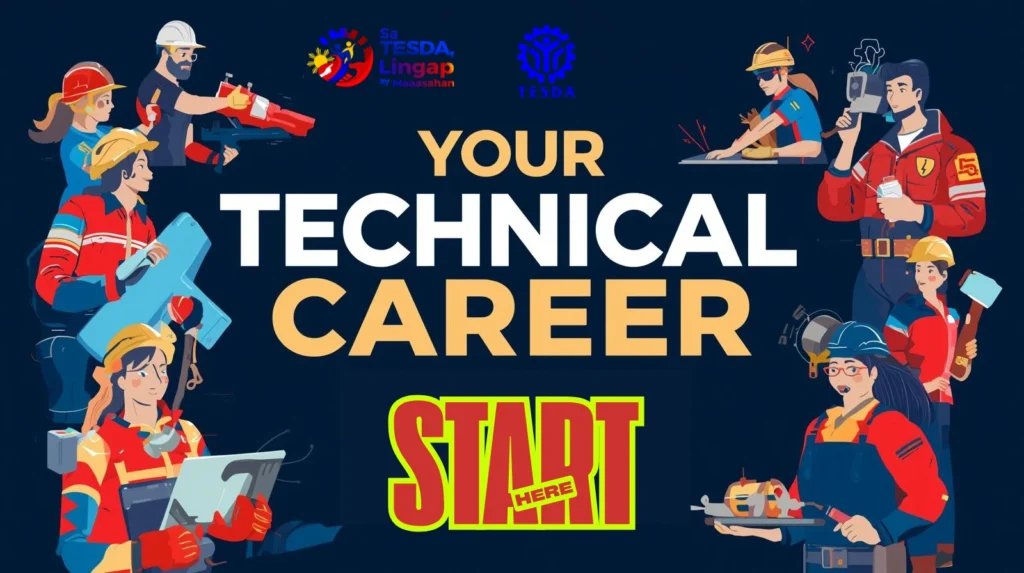
Essential TESDA Contacts:
📞 TESDA Hotline: 8-888-8001
🌐 Official Website: www.tesda.gov.ph
📧 General Inquiries: info@tesda.gov.ph
💻 Online Programs: www.e-tesda.gov.ph
📱 Social Media: @TESDAHQ
For Technical Education: 📧 technicaleducation@tesda.gov.ph
For International Students: 📧 international@tesda.gov.ph
For Scholarships: 📧 scholarships@tesda.gov.ph
Regional TESDA Offices: Complete directory on TESDA website
Job Placement Service: 🌐 www.philjobnet.gov.ph
Your hands can build your future. Your skills can change your life. Your certification can open the world.
TESDA technical education: Where practical skills meet limitless opportunity.
